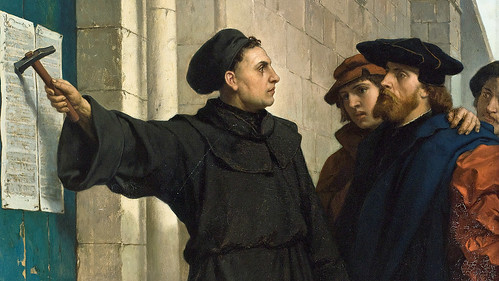In less than a
month, Protestant churches will have great reason to celebrate their heritage.
Oct. 31 will be the 500th anniversary of Martin Luther’s posting of
his 95 theses on the door of Castle Church in Wittenberg, Germany. The event
precipitated the Reformation and the recapturing of great Christian truths and
practices that had been mired in murky tradition and ecclesiastical corruption
during the middle ages.

Under Luther’s impetus, the Evangelical Church was reborn, restoring the individual access to the great tenets of genuine religion: the scriptures available to all people in their own languages, salvation by grace through faith in Jesus Christ alone, with all glory going to God alone, the priesthood of all believers.
I pray that all of
our pastors recognize the importance of this event and recognize it from their
pulpits.
Williston Walker,
in his volume The Reformation in the
set Ten Epochs of Church History by
John Fulton, closes the book with an assessment which follows (in part). If
you’re not convinced yet, perhaps the words of this superb Church historian
will help (pp. 461ff.):
“The Reformation age is the most striking
period in religious history since the
days of the early Church. The threads of
all modern religious life in western Christendom run back into it. …
“[Its tenets] touched society and the common man in the
relationships of every-day life, of personal piety, of government and of social
welfare. It was not an age of … abstruse theology. It was preeminently an
epoch of deeds.
…
“[As] mighty as were the giants of the
Reformation age, the principles that they championed were yet mightier. The
central impulse of the Reformation was a revival of religion. … That
desire, in a new and revolutionary faith that strove to burst the shackles of
externalism which the middle ages had imposed and to bring the human soul into
direct contact with God, was the starting-point of Luther's work. The
Reformation vitalized the religious life of Europe.
“To the Protestant, the profoundest
obligations were to use his divinely-given faculties to ascertain for himself
what is the truth of God as contained — so the Reformation age would say — in
His infallible and absolutely authoritative Word; and to enter through faith
into vital, immediate and personal relations with his Savior.
…
“No wise Protestant will lightly value the
birthright of freedom which the Reformation won for him. Nor can he regard a
movement which has stimulated independence of religious thought, has
promoted investigation, has emphasized
individual responsibility, and has made social, political and intellectual life
freer in a thousand ways as other than an unmeasured blessing.
…
“Christendom has reason to rejoice to this
day that the transition from the mediaeval to the modern world was accompanied
by a profound, searching and transforming revival of religion.”
May we recapture these great Reformation
truths!